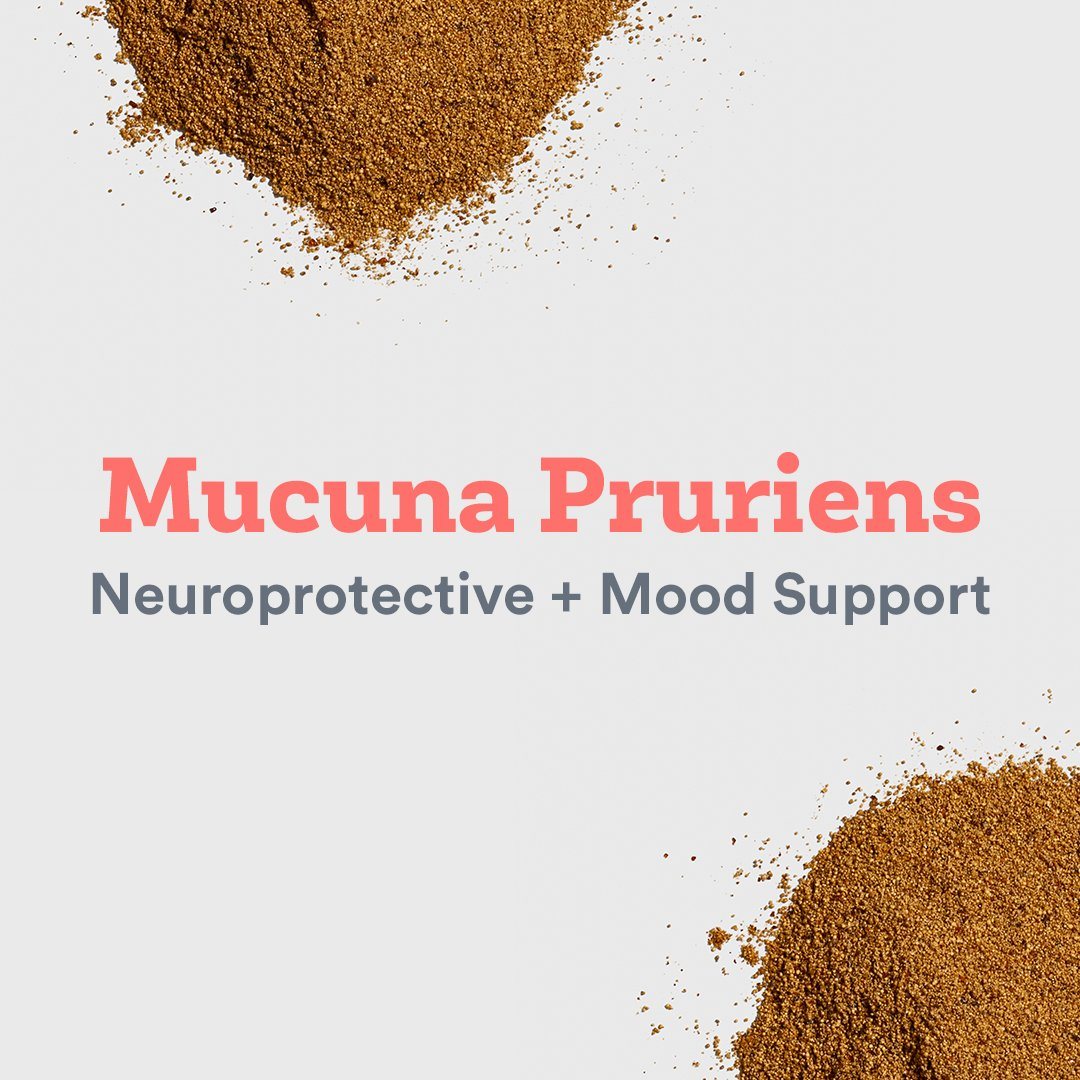
Scientific/Latin name: Mucuna Pruriens
Also known as: Velvet Bean
Native to: Africa and Tropical Asia
Parts used: All parts of the plant are used
Top benefits: Neuroprotective, Mood Boosting and Stress Reducing

Mucuna Pruriens, the Brain Nourishing Velvet Bean
In today’s fast-paced world, most of us can use a little mood and brain boosting, and the magic velvet bean of mucuna pruriens is nature’s solution. With its history of traditional use in alternative medicine and a burgeoning body of clinical trials to support its benefits, you may want to consider adding a mucuna pruriens supplement to your daily routine.
We’ll explain what it is, where it’s from, how it’s used, and how you can add this brain-nourishing ingredient into your everyday life. Spoiler alert: it’s really easy and incredibly delicious.
What Is Mucuna Pruriens?
Mucuna pruriens is a wild legume that now grows throughout many tropical and subtropical regions of the world, where its pods are commonly used for food. A member of the fabaceae family, commonly called “cowitch” or “cowhage,” it is a natural source of nutrients like potassium, magnesium, and calcium.
While all parts of the bean can be used and consumed, mucuna pruriens seeds are the part mostly consumed in parts of Asia, including India. These seeds are considered a rich source of dietary protein and amino acids, at about 23–35% protein, and are rich in minerals.
History of Use
Mucuna is a powerful and popular Indian medicinal plant with a long history of use in traditional Ayurvedic medicine, including as an aphrodisiac and to treat to treat arthritis, nervous disorders and Parkinson’s disease. In fact, its traditional use in degenerative nervous system disorders such as Parkinson’s is clinically supported (see “Neuroprotective” below).
All parts of the mucuna plant possess medicinal properties that have been the subject of clinical studies, including its anti-diabetic, antioxidant, anti-epileptic, anti-microbial, neuroprotective and anti-inflammatory activity.
Health Benefits of Mucuna Pruriens
The effects of mucuna pruriens on brain health and function are impressive. Scientists believe the tannins in mucuna may offer a range of benefits, from supporting blood pressure and blood sugar levels to fighting oxidative stress and inflammation.
Traditional practitioners have long used mucuna pruriens extract for some of the same brain-supportive benefits that science is now beginning to identify. That’s exciting news because it means we can support our brain health and cognitive function naturally and holistically.
Here, we’ll cover the general benefits that researchers have revealed by studying the compounds in this beneficial bean on the brain.
Neuroprotective
One of the main areas of research of mucuna is as a potential treatment for Parkinson’s disease. Mucuna is most commonly known for its high natural concentration (4–7%) of L-dopa, the precursor to dopamine, a key neurotransmitter involved in motivation, mood, learning, memory, attention and even regulating body movements.
Parkinson’s disease is a degenerative disease in which dopamine-producing nerve cells in the brain gradually break down or die, including nerve cells that produce dopamine. Low dopamine levels lead to abnormal brain activity, resulting in symptoms of Parkinson's. In western medicine, doctors use either commercial drugs made with levodopa, or "L-dopa" extracted from mucuna seeds or synthetic forms of L-dopa in order to boost dopamine levels in Parkinson’s patients. On the other hand, in traditional Ayurvedic medicine, whole mucuna seed or extracts of the entire seed are used.
One study comparing commercial L-dopa medications with traditional mucuna preparations found that the quality of motor improvement was the same, but mucuna resulted in faster motor onset and longer duration of effect, suggesting that mucuna may have a higher bioavailability than standard L-dopa preparations. Further research is needed to explain the mechanism of the mucuna seed and determine whether mucuna is a viable, or even preferred alternative to standard L-dopa.
Mood
A more balanced mood is a goal that often seems unattainable, especially in the presence of an overloaded schedule, deadlines, and stress. It can be hard to maintain a work/life balance that supports healthy mood function. The compounds inside the mucuna pruriens bean can help.
Dopamine, Serotonin (aka the ‘feel good chemical’) and Noradrenaline are neurotransmitters (chemical messengers in the brain) that are thought to play a role in regulating mood. Due to mucuna’s role in dopamine creation, studies have examined whether mucuna might also impact mood. In one animal model study, mucuna seed extract was found to have an antidepressant effect, leading researchers to believe that this may be due to mucuna’s ability to increase dopamine levels.
Two other similarly structured animal model studies also found antidepressant activity, together with increased levels of noradrenaline and serotonin neurotransmitters. This demonstrates that mucuna’s effect is likely not limited to dopamine, and leading researchers to suggest that its antidepressant-like property may be mediated via interaction with these neurotransmitters that affect mood. (1, 2)
A third animal model study found similar antidepressant results, and the presence of precursors to both dopamine and serotonin in the subjects’ brains led researchers to suspect these neurotransmitters' involvement in mucuna’s antidepressant-like action.
These findings are significant and call for further research in this area, as clinical studies suggest that disruption in dopamine, serotonin, noradrenaline neurotransmission in the central nervous system is implicated in depression.

Stress
Stress is useful to our bodies in certain circumstances. It helps us meet deadlines and triggers the release of hormones that send our bodies into action in the face of danger. Think of how your body reacts if you are face to face with a venomous snake. Adrenaline begins pumping, cortisol levels rise, and you immediately take evasive action to avoid a snake bite (and potentially snake venom).
On the other hand, stress that remains long after the threat of danger is gone is called chronic stress. Chronic stress can cause disease and illness and threaten the proper functioning of our body and brain. That’s why we want to strengthen the body’s stress response and bring it back to a state of balance.
Mucuna is often touted for its adaptogenic-like qualities (and even referred to as a known adaptogen), however clinical studies supporting its adaptogenic properties are sparse. One study on infertile men who were under psychological stress and suffering from elevated cortisol (stress hormone) levels found that 30 days of treatment with mucuna powder significantly reversed cortisol levels.
The study notes that fertility is known to be affected by various kinds of stressful conditions, including psychological stress, and that stress can also decrease levels of neurotransmitters (including dopamine and noradrenaline) in the brain, which are also known to affect fertility. The researchers therefore suggested that the reduction in stress following use of mucuna may be linked to the high L-dopa concentration of this powerful herb.
For More Hakuna, Try Mucuna
When your days feel less hakuna matata (no worries) and more like a stressful mess, turn to a natural remedy that can help modulate your mood, ease feelings of stress, and even support your brain health. Mucuna pruriens is the solution that helps promote better cognitive function and balanced mood.
The health research presented in this article is for informational use only. It is not a replacement for professional health advice and should not be construed as a recommendation of specific products. The products sold on this website are not intended to diagnose, treat, cure, or prevent any disease. This information does not provide dosage or format recommendations or possible drug interactions, and accordingly, should be used with the advice of a qualified health care practitioner.
